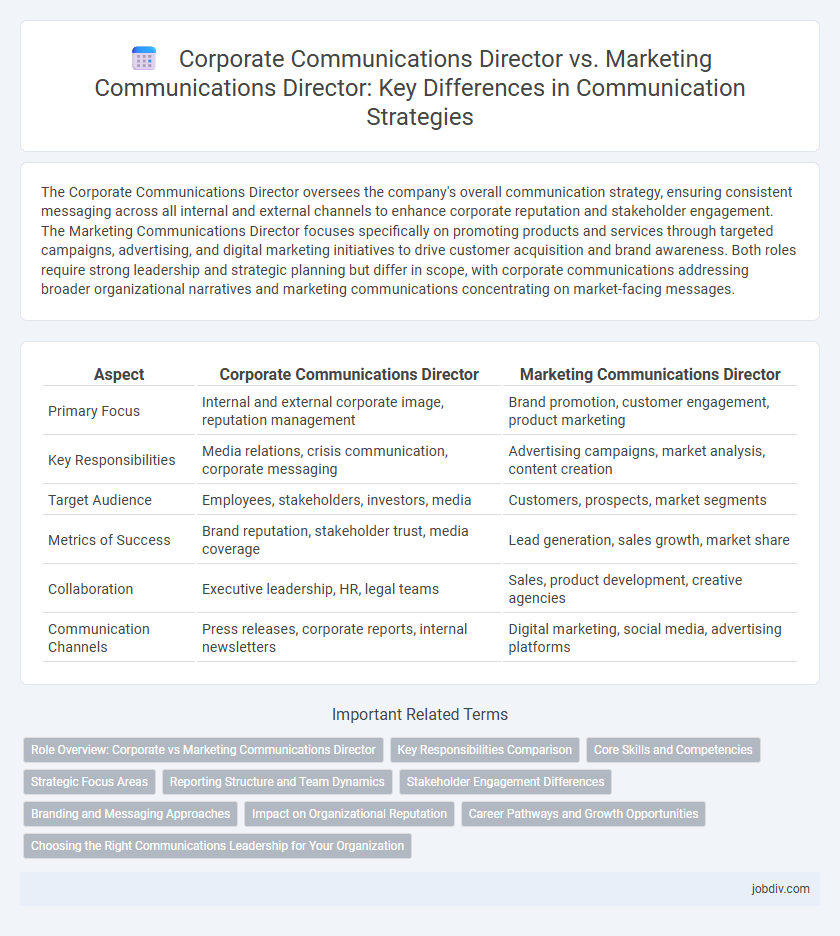The Corporate Communications Director oversees the company's overall communication strategy, ensuring consistent messaging across all internal and external channels to enhance corporate reputation and stakeholder engagement. The Marketing Communications Director focuses specifically on promoting products and services through targeted campaigns, advertising, and digital marketing initiatives to drive customer acquisition and brand awareness. Both roles require strong leadership and strategic planning but differ in scope, with corporate communications addressing broader organizational narratives and marketing communications concentrating on market-facing messages.
Table of Comparison
| Aspect | Corporate Communications Director | Marketing Communications Director |
|---|---|---|
| Primary Focus | Internal and external corporate image, reputation management | Brand promotion, customer engagement, product marketing |
| Key Responsibilities | Media relations, crisis communication, corporate messaging | Advertising campaigns, market analysis, content creation |
| Target Audience | Employees, stakeholders, investors, media | Customers, prospects, market segments |
| Metrics of Success | Brand reputation, stakeholder trust, media coverage | Lead generation, sales growth, market share |
| Collaboration | Executive leadership, HR, legal teams | Sales, product development, creative agencies |
| Communication Channels | Press releases, corporate reports, internal newsletters | Digital marketing, social media, advertising platforms |
Role Overview: Corporate vs Marketing Communications Director
The Corporate Communications Director manages the overall communication strategy to enhance the organization's reputation, focusing on stakeholder relations, internal communications, and crisis management. The Marketing Communications Director develops targeted messaging to support branding and sales campaigns, integrating advertising, public relations, and digital marketing efforts. Both roles require strategic planning and leadership but differ in audience focus, with corporate communications targeting internal and external stakeholders broadly, while marketing communications concentrates on driving customer engagement and market growth.
Key Responsibilities Comparison
The Corporate Communications Director oversees internal and external messaging, crisis management, and brand reputation across all channels to ensure cohesive corporate identity. The Marketing Communications Director focuses on developing and executing promotional campaigns, product messaging, and customer engagement strategies to drive sales and market share. Both roles require strategic planning and communication expertise but emphasize distinct aspects of organizational communication objectives.
Core Skills and Competencies
Corporate Communications Directors excel in strategic messaging, crisis management, and stakeholder engagement, ensuring consistent brand reputation across all platforms. Marketing Communications Directors specialize in campaign development, product positioning, and consumer targeting, driving market growth through persuasive storytelling and data-driven insights. Both roles demand strong leadership, media relations expertise, and proficiency in digital communication tools.
Strategic Focus Areas
Corporate Communications Directors primarily concentrate on reputation management, internal communications, and stakeholder relations to ensure cohesive messaging across all channels. Marketing Communications Directors focus on brand positioning, campaign development, and customer engagement strategies designed to drive sales and market share growth. Both roles require strategic alignment but diverge in targeting external audience perceptions versus driving commercial outcomes.
Reporting Structure and Team Dynamics
The Corporate Communications Director typically reports to the Chief Communications Officer or CEO, overseeing internal and external messaging that aligns with overall corporate strategy, while the Marketing Communications Director often reports to the Chief Marketing Officer, focusing on promotional campaigns tied to product and brand marketing. The Corporate Communications team collaborates closely with executive leadership, legal, and human resources to manage company reputation, crisis communication, and shareholder relations. In contrast, the Marketing Communications team works alongside sales, product management, and creative departments to drive customer engagement and market growth through targeted messaging and advertising.
Stakeholder Engagement Differences
The Corporate Communications Director primarily focuses on engaging internal and external stakeholders through strategic messaging that enhances corporate reputation, investor relations, and employee communication. In contrast, the Marketing Communications Director targets customer-centric stakeholders, driving brand awareness, product promotion, and market positioning through advertising and digital campaigns. Both roles require tailored engagement strategies, but the Corporate Communications Director emphasizes relationship management with shareholders, media, and government bodies, while the Marketing Communications Director prioritizes consumer interaction and market feedback.
Branding and Messaging Approaches
Corporate Communications Directors concentrate on cultivating a consistent brand image through strategic messaging that aligns with overall corporate values and stakeholder expectations. Marketing Communications Directors focus on driving customer engagement and sales by crafting targeted campaigns that highlight product benefits and market positioning. Both roles require a nuanced understanding of brand identity, but Corporate Communications emphasizes reputation management while Marketing Communications prioritizes persuasive promotional content.
Impact on Organizational Reputation
A Corporate Communications Director shapes organizational reputation by managing public relations, crisis communication, and stakeholder engagement to build trust and credibility across multiple audiences. In contrast, a Marketing Communications Director enhances reputation primarily through targeted brand messaging and promotional campaigns that drive customer perception and market positioning. Both roles significantly influence organizational reputation, but the Corporate Communications Director focuses on broader reputation management while the Marketing Communications Director emphasizes brand image within the market.
Career Pathways and Growth Opportunities
A Corporate Communications Director often progresses from roles in public relations, internal communications, or media relations, focusing on managing company reputation, crisis communication, and stakeholder engagement. In contrast, a Marketing Communications Director typically advances through marketing, advertising, or brand management positions, specializing in campaign strategy, product messaging, and customer outreach. Growth opportunities for Corporate Communications Directors include executive roles in corporate affairs or public policy, while Marketing Communications Directors may move toward chief marketing officer positions or strategic brand leadership.
Choosing the Right Communications Leadership for Your Organization
Selecting the right communications leadership hinges on your organization's core objectives: a Corporate Communications Director excels in managing internal communications, stakeholder relations, and brand reputation, ensuring cohesive messaging across all corporate channels. In contrast, a Marketing Communications Director drives market-facing campaigns, focuses on customer engagement, and aligns communication strategies with sales and product launches to enhance brand visibility and demand generation. Organizations prioritizing investor relations and employee engagement benefit from Corporate Communications leadership, while those aiming to boost market presence and drive revenue growth should consider a Marketing Communications Director.
Corporate Communications Director vs Marketing Communications Director Infographic

 jobdiv.com
jobdiv.com